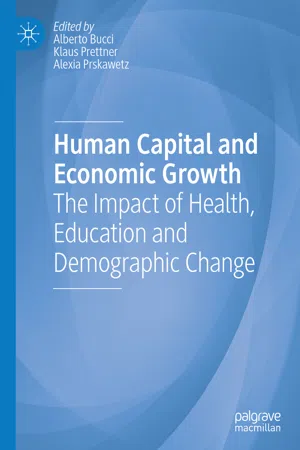1.1 Introduction
This chapter offers an empirical investigation of the relationship between human capital and per capita GDP growth across countries. Previous studies have detected strong non-linearities (thresholds) in this relationship, see for example Kalaitzidakis et al. (2001) and Savvides and Stengos (2009). The leading theoretical explanation for these findings is that human capital accumulation by individual agents will confer external economies to other agents, increasing their productivity and producing increasing returns on an aggregate basis. These spillover effects, if strong enough, may result in multiple equilibria including low-growth or poverty traps. More recently, economists have focused on the quality of institutions in conditioning the interactions between agents. Our empirical analysis factors in this aspect. We also highlight that human capital accumulation by women has a very different impact from human capital accumulation by men.
Our analysis is based on the threshold regression model introduced by Hansen (2000) and, specifically, on its most recent version developed by Kourtellos et al. (2013, 2016). The approach that we take here differs from the semiparametric methodology adopted by Kalaitzidakis et al. (2001) and Savvides and Stengos (2009) to estimate the human capital economic growth nexus. The main difference is that in the previous work any evidence of turning points (thresholds) was made thorough a smooth transition without proper testing. In our current approach we are able to obtain “sharp” turning points and test for their significance. Through all our regressions the dependent variable is the growth of GDP per capita, while human capital and, precisely, primary education—disaggregated by gender—is the threshold variable.
Our empirical procedure is divided in two steps: the first consists in testing for the presence of a threshold in human capital. If the null of no such presence is rejected the next step consists in estimating the threshold regression parameters, dividing the sample in two regimes obtained by separating the observations above and below the threshold. The procedure is repeated using fitted values of human capital, which are estimated using institutional quality as an instrumental variable. This approach is employed to deal with the possible endogeneity of human capital.
Our results consistently reject the null hypothesis of no thresholds in the effect of human capital on growth, with the exception of fitted female primary education. Otherwise, non-linearities emerge very clearly as slope coefficients change in magnitude from one regime to the other. Comparing results for female primary education and fitted male primary education provides some interesting insights. In fact, the effect of these variables on growth of GDP per capita is in the case of female education much higher in the low-education regime, while the opposite is true for male education.
Overall, regression results confirm the non-linear shape of the relationship between human capital and growth, while showing the importance of institutions and gender. Mo...
